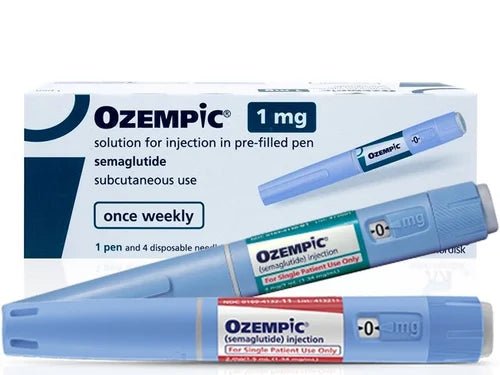Managing Blood Sugar with Ozempic
Managing Blood Sugar with Ozempic is a valuable tool for adults with type 2 diabetes who are looking to effectively control their blood sugar levels. This injectable medication not only aids in blood sugar management but also offers the potential for modest weight loss. The active ingredient, semaglutide, has also gained FDA approval for treating obesity under the brand name Wegovy. Even individuals without diabetes have started using Ozempic off-label for weight loss due to its ability to activate GLP-1 receptors in the body, which helps control blood sugar and decrease hunger. However, it is important to note that while the medication may contribute to weight loss during its use, there is a possibility of weight regain if it is discontinued. Ultimately, Ozempic serves as a powerful tool in managing blood sugar levels and even offers the potential for weight loss for those who need it.

1. What is Ozempic?
1.1 Definition and purpose
Ozempic is an injectable medication used to manage blood sugar in adults with type 2 diabetes. It belongs to a class of drugs called GLP-1 receptor agonists, which work by mimicking the effects of a hormone called glucagon-like peptide-1 (GLP-1) in the body. This hormone helps regulate blood sugar levels by stimulating insulin production, slowing down food digestion, and reducing appetite.
1.2 How it is administered
Ozempic is administered as a subcutaneous injection, which means it is injected into the fatty tissue just beneath the skin. It is typically injected once a week, using a prefilled pen device that makes it easy and convenient to self-administer. The pen is designed to deliver a specific dose of Ozempic, as prescribed by your healthcare provider. It is important to follow the instructions for injection provided by your healthcare professional to ensure proper usage and effectiveness of the medication.
2. Effects of Ozempic on Blood Sugar Management
2.1 Mechanism of action
The main mechanism of action of Ozempic Injection is its ability to activate GLP-1 receptors in the body. GLP-1 is a hormone that is released by specialized cells in the gut in response to food intake. When GLP-1 binds to its receptors, it stimulates the release of insulin from the pancreas, which helps lower blood sugar levels. Additionally, GLP-1 also slows down the emptying of the stomach, which can help control the amount of glucose released into the bloodstream after a meal.
2.2 Activation of GLP-1 receptors
By activating GLP-1 receptors, Ozempic helps promote insulin secretion, suppresses glucagon release (a hormone that increases blood sugar levels), and slows down gastric emptying. These actions contribute to improved blood sugar control and help prevent spikes and fluctuations in blood sugar levels throughout the day.
2.3 Controlling blood sugar levels
The activation of GLP-1 receptors by Ozempic not only helps lower blood sugar levels but also reduces the risk of hypoglycemia (low blood sugar). This is because GLP-1 receptor agonists like Ozempic only stimulate insulin secretion when blood sugar levels are elevated, which helps maintain a more balanced and stable blood sugar profile. By effectively managing blood sugar levels, Ozempic can help individuals with type 2 diabetes achieve and maintain target blood sugar goals and reduce the risk of long-term complications associated with uncontrolled diabetes.
3. Ozempic for Weight Loss
3.1 Research on weight loss
In addition to its blood sugar-lowering effects, research suggests that people who take Ozempic may experience modest weight loss. Studies have shown that individuals with type 2 diabetes who took Ozempic as part of their diabetes management regimen experienced greater weight loss compared to those who were not on the medication. It is important to note that the extent of weight loss may vary from person to person and individual results may differ.
3.2 Role of semaglutide
The active ingredient in Ozempic is semaglutide, which is a synthetic form of GLP-1. Semaglutide has been found to have an impact on weight loss by acting on areas of the brain that control appetite and food intake. It helps decrease hunger and increase feelings of satiety, leading to reduced food consumption and subsequent weight loss.
3.3 FDA approval as Wegovy
The weight loss benefits of semaglutide were so significant that the U.S. Food and Drug Administration (FDA) approved a higher dose of semaglutide, under the brand name Wegovy, specifically for the treatment of obesity in individuals without diabetes. This approval provides further evidence of the effectiveness of semaglutide in promoting weight loss and supports its use as a potential option for individuals looking to lose weight.
4. Off-label Use of Ozempic for Weight Loss
4.1 Popularity among people without diabetes
Given the weight loss benefits associated with Ozempic and semaglutide, some people without diabetes have started using Ozempic off-label for weight loss. Off-label use refers to the use of a medication for a purpose other than what it was originally approved for. While there may be anecdotal evidence of successful weight loss with Ozempic in individuals without diabetes, it is important to note that this use is not supported by clinical studies specifically conducted in this population.
4.2 Potential risks and benefits
Using Ozempic off-label for weight loss may carry potential risks and benefits. On one hand, individuals may experience weight loss as a result of decreased appetite and improved blood sugar control. On the other hand, the safety and long-term effects of using Ozempic for weight loss in individuals without diabetes have not been extensively studied. It is important to consult with a healthcare professional before considering off-label use of Ozempic for weight loss, as they can provide guidance on the potential risks and benefits based on individual health factors and medical history.

5. Managing Blood Sugar with Ozempic
5.1 Effectiveness of Ozempic
Ozempic has been shown to be highly effective in managing blood sugar levels in individuals with type 2 diabetes. Clinical studies have demonstrated that, when used as part of a comprehensive diabetes management plan, Ozempic can significantly reduce HbA1c levels (a long-term measure of blood sugar control) and help individuals achieve their target blood sugar goals. This reduction in HbA1c levels is particularly important in reducing the risk of diabetes-related complications and improving overall health outcomes.
5.2 Dosage and administration
The dosage of Ozempic may vary depending on individual needs and healthcare provider recommendations. Typically, Ozempic is initiated at a lower dose and gradually increased over time to find the most effective and well-tolerated dose for each individual. It is important to follow the prescribed dosage and the recommended injection schedule provided by your healthcare professional to ensure optimal effectiveness and safety.
5.3 Monitoring blood sugar levels
Regular monitoring of blood sugar levels is crucial when using Ozempic to manage diabetes. This helps ensure that blood sugar levels are adequately controlled and adjustments to medication dosages can be made if necessary. Your healthcare provider may recommend self-monitoring of blood sugar levels at home using a glucose meter or periodic laboratory tests to assess long-term blood sugar control. By closely monitoring blood sugar levels, adjustments can be made to the diabetes management plan, including medication dosage and lifestyle modifications, to optimize blood sugar control and overall health outcomes.
6. Long-Term Use of Ozempic
6.1 Sustainability of weight loss
While Ozempic may help with weight loss while on the medication, most people will regain weight if they stop using it. Weight maintenance and long-term sustainability of weight loss is a significant challenge for many individuals. It is important to recognize that the benefits achieved during Ozempic treatment may require ongoing efforts to maintain. This includes incorporating healthy eating habits, regular physical activity, and other lifestyle modifications to support weight management efforts even after discontinuation of the medication.
6.2 Potential side effects
Like any medication, Ozempic may be associated with potential side effects. Common side effects include nausea, vomiting, diarrhea, constipation, and decreased appetite. These side effects are usually mild and transient, and most individuals tolerate the medication well. However, it is important to speak with your healthcare provider if you experience any persistent or bothersome side effects while taking Ozempic. They can provide guidance and adjust the treatment plan if necessary to address any side effects or concerns.
6.3 Considerations for long-term use
When considering long-term use of Ozempic, it is important to have open and ongoing communication with your healthcare provider. They can help monitor the effectiveness of the medication, assess any potential side effects or risks, and make any necessary adjustments to the treatment plan. Additionally, addressing any concerns or questions about long-term use, sustainability of weight loss, and overall health management is essential for ensuring a comprehensive and individualized approach to diabetes care.

7. Regaining Weight after Stopping Ozempic
7.1 Weight regain patterns
It is important to acknowledge that weight regain is common after discontinuing Ozempic. This is often attributed to the fact that Ozempic helps control appetite and food intake, making it easier to maintain a calorie deficit and lose weight. Once the medication is stopped, the appetite-regulating effects diminish, and it may become more challenging to sustain weight loss without continued support and lifestyle modifications.
7.2 Importance of lifestyle changes
To mitigate the risk of weight regain after stopping Ozempic, it is crucial to focus on implementing and maintaining healthy lifestyle changes. This includes adopting a balanced and nutritious eating plan, engaging in regular physical activity, getting adequate sleep, managing stress levels, and seeking ongoing support from healthcare professionals or other support networks. These lifestyle changes are key to achieving long-term weight management and overall health improvements, independent of the use of Ozempic.
7.3 Working with healthcare professionals
Working in collaboration with healthcare professionals throughout the weight loss journey can be instrumental in addressing concerns and challenges associated with weight regain. Regular follow-up appointments with healthcare providers can help monitor progress, provide ongoing support and guidance, and adjust treatment plans as needed. Healthcare professionals can also help individuals develop strategies to sustain weight loss and make necessary modifications to address any barriers or obstacles that may arise.
8. The Role of Ozempic in Diabetes Management
8.1 Combining with other medications
Ozempic can be an effective component of a comprehensive diabetes management plan, which may include other oral medications or insulin therapy. Your healthcare provider will determine the most appropriate treatment regimen based on individual needs, medical history, and blood sugar control goals. Ozempic can complement other diabetes medications by providing additional blood sugar control and potential weight loss benefits.
8.2 Lifestyle modifications
Alongside medication management, incorporating lifestyle modifications is an integral part of diabetes management. Eating a balanced diet composed of whole foods, engaging in regular physical activity, managing stress, and getting sufficient sleep are crucial for maintaining overall health and blood sugar control. Ozempic can support these lifestyle changes by helping to reduce appetite, control blood sugar levels, and potentially contribute to weight loss.
8.3 Regular monitoring and follow-up
Regular monitoring of blood sugar levels and ongoing follow-up with healthcare providers are essential for effective diabetes management. This allows for the necessary adjustments to medication dosages, lifestyle modifications, and support to optimize blood sugar control and overall health outcomes. By working closely with healthcare professionals, individuals can stay proactive in managing their diabetes and make informed decisions regarding their treatment plan.
9. Managing Expectations with Ozempic
9.1 Realistic weight loss goals
When considering the use of Ozempic or any other weight loss medication, it is important to have realistic expectations about the outcomes. While Ozempic has shown promise in promoting weight loss, individual results may vary. It is essential to understand that weight loss is a gradual process and that sustainable weight loss often occurs at a rate of 1-2 pounds per week. Setting realistic and achievable weight loss goals can help individuals stay motivated and focused on their overall health journey.
9.2 Individual variations
It is important to recognize that each person's response to Ozempic may vary. Some individuals may experience significant weight loss, while others may experience more modest results. Factors such as genetics, metabolism, adherence to the medication and lifestyle modifications, and overall health status can influence individual variations in weight loss outcomes. It is essential to focus on personal progress and improvements rather than comparing oneself to others.
9.3 Psychological and emotional support
Weight loss can be both a physical and emotional journey. It is essential to address the psychological and emotional aspects associated with weight management. Seeking support from healthcare professionals, therapists, or support groups can provide valuable tools to navigate the emotional challenges and establish a healthy relationship with food, body image, and overall well-being. Incorporating self-care practices and engaging in activities that promote mental well-being can also be beneficial throughout the process.
10. Conclusion
Ozempic is a valuable medication for individuals with type 2 diabetes in managing blood sugar levels and potentially promoting weight loss. Its mechanism of action, activation of GLP-1 receptors, helps control blood sugar and decrease appetite, leading to improved blood sugar management and potential weight loss. However, it is important to approach the use of Ozempic and any weight loss medication with realistic expectations and a holistic approach that includes lifestyle modifications, regular monitoring, and ongoing support from healthcare professionals. By working together, individuals can achieve their diabetes management goals, maintain long-term weight loss, and promote overall health and well-being.






